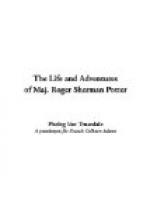“They had been spending the evening at your father’s house, and were regaled with cider of such uncommon strength as to make a deep impression upon their sensibilities. The doctor declared they drank nothing stronger, notwithstanding the parson accused him of having a small flask in his pocket. It was late when they left the house; and as they had been warmly discussing whether it was right in the sight of God to hang a woman for killing her drunken husband, without coming to any decision, they agreed to change the subject to one of a theological character, it being absolutely necessary that they have something to debate on their way home. The doctor inquired of the parson, what he thought of the doctrine held by many popular divines, that God made Moses and Elijah visible to the Apostles on the occasion of the transfiguration. The parson, after pausing a few moments, and remarking that he had a curious feeling in his head, which seemed to sit unsafely upon his shoulders, replied that the question was of too abstruse a nature to be debated by any but members of his own profession, to which it of right belonged. If he were to speak his mind it would be to give doctors in general no very high reputation for either morals or religion. ’True history never gave them much mention; and though Aristotle had treated their vagaries with great condescension, Cicero never could be got to look with favor upon them. Yours is a mischievous profession, the members of which are always seeking the demolition of useful sciences.’ This the parson said in so angry a tone that it excited the pugnacity of the doctor, who was scrupulous of his profession, and declared he would not stand by and hear it slandered.




